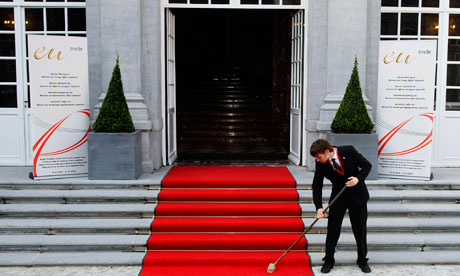
Grant Gillespie's debut novel isn't just called The Cuckoo Boy because it's about an awkward adopted child who wears down his parents and is implicated in the death of a sibling. Gillespie is attempting to re-energise the cliché by using it to ask questions about chance and intention, and good and evil.
Late on in the book, when most of the world has already made him a pariah, James, the strange hero, says: "Cuckoos lay their eggs in other bird's nests. The chicks look really silly. I've seen them in books … a big baby bird and a really small one trying to feed it. They have to catch even more worms than ever. The mother bird's babies die. They get pushed from the nest … Is that murder or is it an accident?"
The answer he is pushing for is that it's "just nature". What happens to the chicks is unpleasant, but it would be wrong to heap opprobrium on the cuckoo. Nature isn't always pleasant, after all – certainly not if you believe Gillespie, who fills much of this book with graphic examples of nature's incidental cruelty (as well as frequently repeating the old saw about it being "red in tooth and claw" for good measure). Lambs have their eyes pecked out by crows. Babies are killed by cats. Cats are gassed by distraught mothers. Children have letters cut into their arms and form gangs and factions and force each other to do foolish and terrible things. One little girl jumps onto a fork concealed in a hay bale. James is thrown into a pit full of dead pigs in a nasty bit of woodland. Then he also does something terrible and we are forced to consider whether he should really be held accountable, or whether he is himself a victim of the way of the world.
It's a brave attempt to address a discomforting question – made yet more unsettling by clear reminders of the way the press at once branded James Bulger's killers feral animals while demanding they be tried as reasonable adults. This is a novel that pushes its readers to places they might not want to go, and for that it deserves admiration.
Even so – and even though all that red-in-tooth-and-claw stuff crackles with dark energy – there are real problems with The Cuckoo Boy. Gillespie's thesis about nature is undercut by the fact that most of the world he describes and the characters in it are unreal. It isn't just the fact that the protagonist's development is highly improbable (not smiling until – as achingly dramatic luck has it – his first birthday; not moving until he is two-and-a-half when all at once he learns how to walk). It's also that so many of his interactions are unconvincing.
I didn't ever believe in James's relationship with his adoptive mother, Sandra, for instance. They communicate at a pitch that always seems too high. They're always either raging, hopeless with love or "heavy with defeat" and it becomes monotonous. Not that Sandra is a consistent character: she shifts in and out of focus and is forever changing shape, hateful one minute, loving the next. On one page she is suffering from paranoid delusions, on the next she is normal, the whole thing apparently forgotten. She's a chimera, but for her name and the fact that she maintains an obsessive-compulsive insistence on tidiness throughout. She's impossible to cling onto or to believe in, and tedious to have around.
Other characters present similar challenges. James has a pretend friend called David who we are told has disappeared on one page, only to find him back in full effect in the next. He also has a real friend called David who changes his behaviour in ways that are quite baffling, even though central to the plot. Much of the landscape of the book seems arbitrary, too. Why is there a big pig graveyard in a wood? I couldn't work it out beyond the fact that James had to be pushed into it and Gillespie wanted to draw an allusion to Lord of the Flies.
The net result is a book that is unconvincing and lacking in emotional weight – and that's before we get to the mechanics of the writing. Although Gillespie can write vividly and with bracing unpleasantness, too much of the book is undermined by howling mistakes and hackneyed, clunky prose. How to suspend disbelief when we are told a room is "a veritable assault of buttercup yellow"? When we learn that someone was wearing "a purple ubiquitously seventies polo-neck"? When a chair is described as "exfoliating"? When the phrase "like a cartoon character" is used twice within a dozen or so pages? When seemingly every 10th page there is a "cut-with-a-knife atmosphere" and/or time is "sliced in two"? When in the crucial final paragraph the all important press reacts as if it is "feeding time at the zoo"?
And yet, tempting as it is, I can't end on feeding time at the zoo. Before handing this over for comment I feel compelled to say again that The Cuckoo Boy has a lot going for it. It's just a shame that so many of its good foundations are wrecked by sloppy writing, inconsistency and half-baked ideas. The imprint To Hell with Publishing deserve respect for putting out such a risky book by a young writer – but they'd deserve even more if they had let the thing mature properly. That's my take on it, anyway. What do you think?
Next up: Deloume Road by Matthew Hooton

